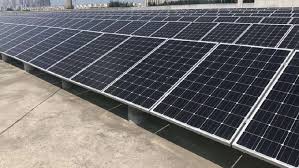
Nigeria not ripe for ban on importation of solar panels — CPPE
Dr. Muda Yusuf, the Chief Executive Officer of the Centre for the Promotion of Private Enterprise (CPPE), has expressed concerns regarding the proposed ban on the importation of solar panels into Nigeria.
This call for a ban was made by the Minister of Science and Technology, Mr. Uche Nnaji, as a strategy to encourage local production of solar panels.
In his statement issued yesterday, Dr. Muda highlighted that Nigeria faces significant challenges in energy access, with a per capita electricity consumption of approximately 160 kWh, which is considerably lower than the sub-Saharan average of 350 kWh. He emphasized that embracing solar energy solutions is crucial for improving energy security in the country.
Dr. Muda warned that the suggested ban on solar panel imports would exacerbate the nation’s energy poverty. He remarked, “The Centre for the Promotion of Private Enterprise (CPPE) is alarmed by the statement attributed to the Minister of Science and Technology, Mr. Uche Nnaji, regarding the government's intention to prohibit the importation of solar panels to foster domestic production.”
He further stated, “At present, Nigeria's energy access is among the lowest globally, with a per capita electricity consumption of around 160 kWh, significantly below the sub-Saharan average of 350 kWh. The promotion of solar energy solutions represents one of the most effective governmental initiatives to address this issue, which has gained substantial momentum. Implementing a ban on solar panel imports, especially given the current insufficient domestic production capacity, would only intensify the country’s energy crisis.”
Dr. Muda added, “Such a ban contradicts the government’s policy aimed at enhancing and promoting the use of renewable energy solutions among households, small businesses, rural communities, government institutions, and corporate entities. The adoption of solar energy has seen impressive growth over the past two years, particularly in light of rising energy costs in the economy. This ban would further complicate energy access, making solar energy solutions unaffordable for the average Nigerian.”
The economic impact of prohibiting the importation of solar panels would be significantly detrimental due to the increased expenses associated with obtaining solar energy solutions. Currently, the high cost of acquiring these solutions is already a concern. Therefore, it is essential to focus on strategies that enhance affordability instead of further raising costs.





